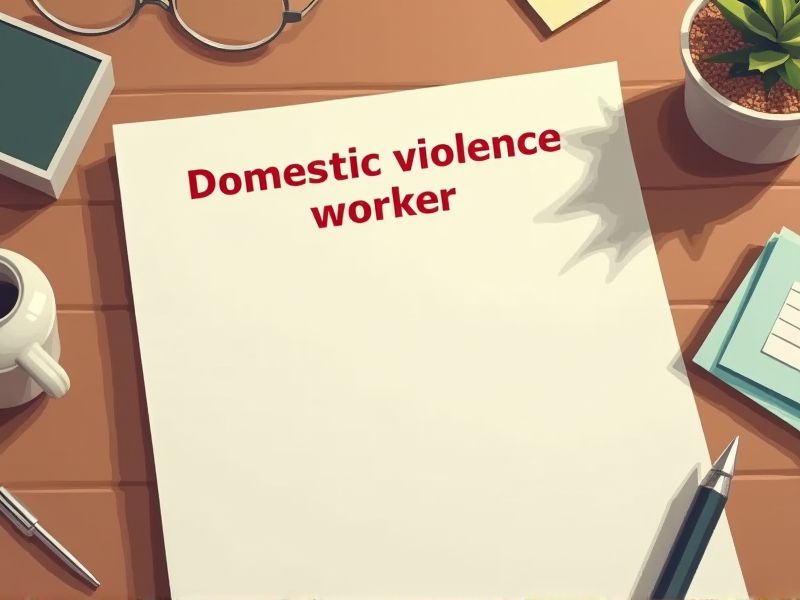
Domestic violence workers confront complex and sensitive situations that require specialized skills and knowledge. A certification ensures they have the proper training to handle cases safely and effectively. These credentials not only establish credibility but also align with legal and ethical standards needed in crisis intervention. Here are some important certifications essential for a domestic violence worker.
Certified Domestic Violence Advocate
Certified Domestic Violence Advocates possess specialized training, ensuring they can offer effective support and resources to survivors. This certification equips them with critical knowledge about legal rights, safety planning, and community resources that untrained workers may lack. The role requires an understanding of trauma-informed care to provide sensitive and appropriate assistance to victims. Certification also serves as a validation of their expertise, increasing the trustworthiness and reliability in the eyes of those they help and collaborate with.
Domestic Violence Crisis Intervention Certification
Domestic Violence Crisis Intervention Certification provides domestic violence workers with essential skills to effectively assess and respond to crisis situations, reducing the risk of harm to victims. Certified workers gain a deeper understanding of the complex dynamics of abuse, enabling them to offer more informed and empathetic support to survivors. With certification, workers are better equipped to collaborate with legal systems and community resources, ensuring comprehensive assistance to victims. Certification also lends credibility and professional standards to the workers, increasing trust and confidence among survivors seeking help.
Trauma-Informed Care Certification
Trauma-Informed Care Certification equips domestic violence workers with the essential skills to recognize and appropriately respond to trauma-related behaviors, leading to more effective support for survivors. This certification fosters a deeper understanding of the physiological and psychological impacts of trauma, enabling workers to approach cases with heightened sensitivity and empathy. By prioritizing safety and trustworthiness, certified professionals help mitigate the risk of re-traumatization during interactions with clients. Better-informed workers can contribute to more positive outcomes in the recovery and healing processes of individuals affected by domestic violence.
Victim Advocacy Certification
Victim advocacy certification equips domestic violence workers with essential knowledge on trauma-informed care and intervention strategies, crucial for survivor support. Certification ensures standardized, consistent approaches, fostering trust between survivors and advocates. Workers gain insights into legal processes, enhancing their ability to navigate complex systems on behalf of victims. Comprehensive training through certification often leads to increased confidence and credibility in dealings with law enforcement and judicial entities.
Safety Planning and Risk Assessment Certification
Domestic violence workers with Safety Planning and Risk Assessment Certification are better equipped to identify and respond to signs of immediate danger, directly contributing to victim safety. The certification process enhances their ability to evaluate the severity and potential escalation of violence, permitting timely and appropriate interventions. It also ensures that workers can develop comprehensive safety plans tailored to individual circumstances, increasing the practicality and effectiveness of support provided. Data shows that informed interventions significantly reduce the risk of harm to victims, underlining the necessity of specialized certification.
Lethality Assessment Training Certification
Lethality Assessment Training Certification equips domestic violence workers to effectively identify potential risks, thereby increasing the safety of victims. By understanding warning signs and risk factors, workers can develop tailored interventions that prevent escalation. The certification enhances collaboration with law enforcement and other services, improving response times and resource allocation. Evidence suggests that such training significantly lowers the incidence of severe or fatal domestic violence incidents.
Crisis Intervention and De-escalation Certification
The Crisis Intervention and De-escalation Certification equips domestic violence workers with specialized skills to manage volatile situations effectively. Enhanced training in de-escalation techniques reduces the risk of harm to both the victim and the worker. The certification ensures workers can provide immediate, evidence-based responses, improving client outcomes. Continuous education supports adherence to best practices, fostering a safer environment for all involved.
Confidentiality and Ethics in Domestic Violence Services Certification
Confidentiality ensures that victims' identities and personal experiences remain protected, fostering a safe and trusting environment for individuals seeking help. Without ethical guidelines, domestic violence workers may struggle to navigate the complex emotional and legal landscapes their clients grapple with. Certification in confidentiality and ethics equips workers with the necessary skills to handle sensitive information responsibly and maintain professional integrity. Formal training can reduce incidences of secondary harm or victimization, reinforcing the service provider's role as a safe haven for those in crisis.
Child Abuse Prevention Certification
Child Abuse Prevention Certification equips domestic violence workers with the knowledge to recognize signs of abuse, which is crucial for effective intervention. Understanding the dynamics of child abuse enhances their ability to assess risk accurately and provide appropriate support. Certification ensures that workers are trained in legal requirements and reporting obligations, preventing potential liabilities. The certification also fosters a supportive environment where intervention strategies are informed by best practices and current data.
Cultural Competency in Domestic Violence Services Certification
Cultural competency ensures domestic violence workers understand the diverse backgrounds and unique needs of clients, facilitating more effective support. Misunderstandings can arise without this knowledge, leading to ineffective interventions and further trauma for survivors. When workers are culturally competent, trust is more easily built, increasing the likelihood of survivors seeking and adhering to assistance. Certification in cultural competency can standardize these essential skills across the field, ensuring consistent and equitable service provision.
Summary
When you obtain certifications as a domestic violence worker, your credibility and professional standing within your field significantly increase. Employers and clients trust your expertise more, potentially leading to improved job opportunities and higher salaries. Advanced certifications can also equip you with specialized skills, enhancing your ability to support victims effectively. This professional growth positively impacts the community, fostering a safer and more informed environment for addressing domestic violence issues.
